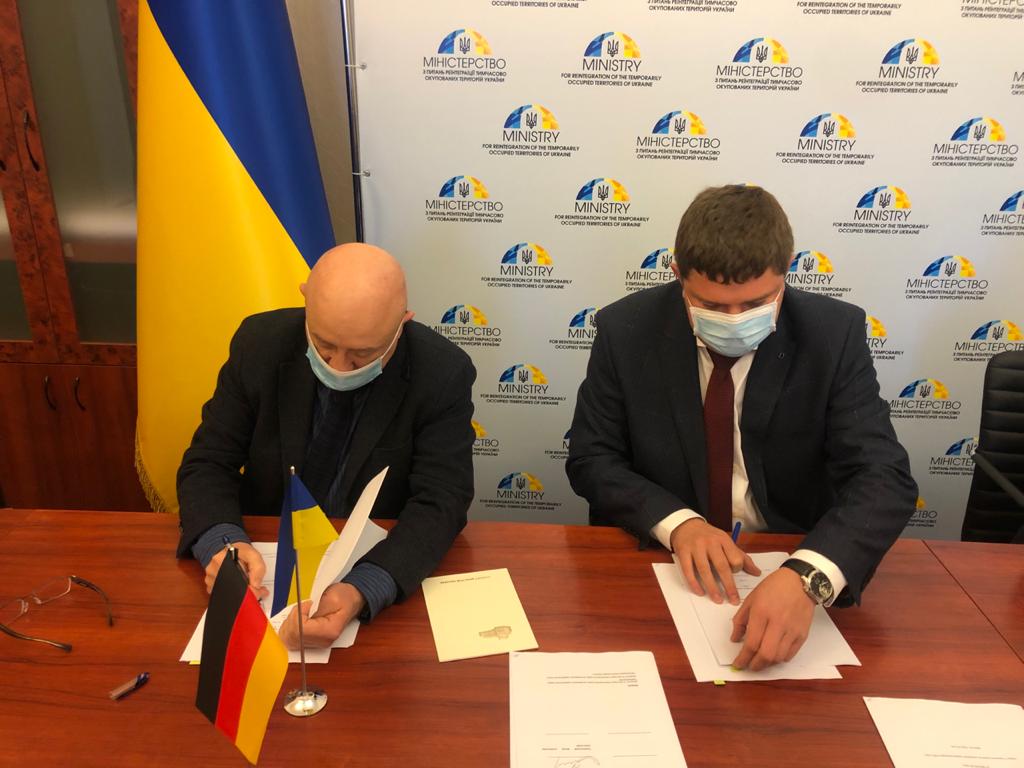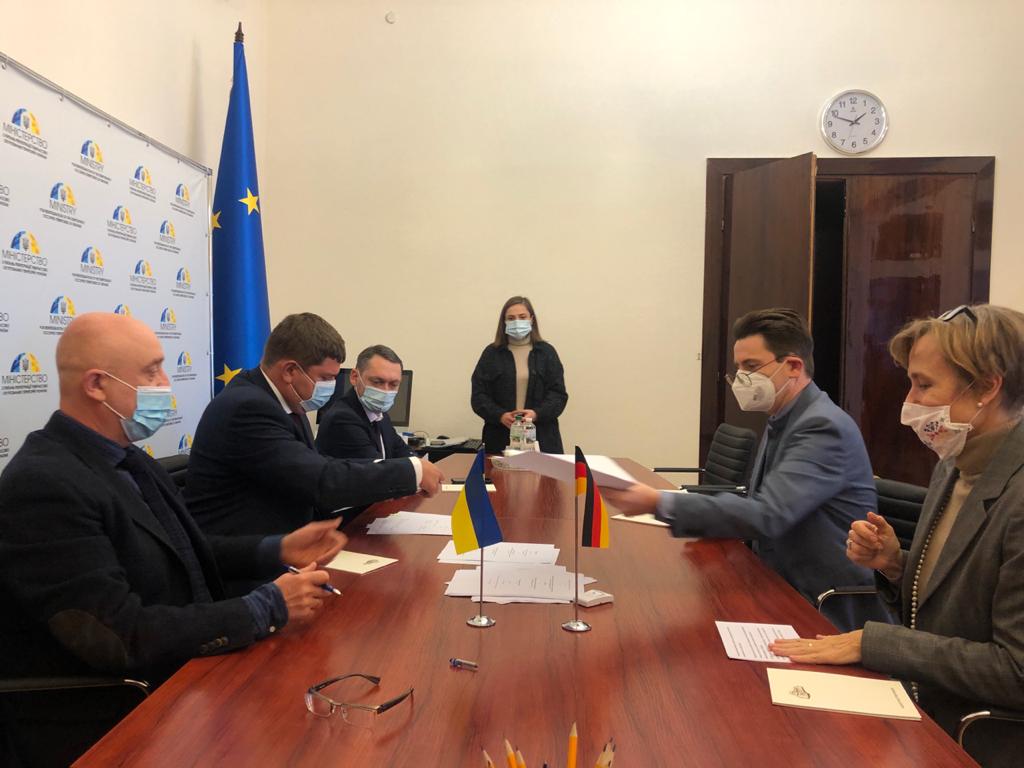Start of implementation of the new Project and approval of strategic directions for further USIF development

Since February this year, the list of areas in which Germany cooperates and provides assistance to Ukraine will be expanded to include another important area: provision support in counteraction to COVID-19 pandemic and overcoming of this disease consequences.
The relevant Financial and Project Agreement was signed on February 8 in Kyiv by Olaf Zymelka, Director of the Department of German State Development Bank KfW, Oleksiy Reznikov, Vice-Prime-Minister of Ukraine - Minister for Reintegration of Temporarily Occupied Territories of Ukraine and Andriy Laktionov, Executive Director of the Ukrainian Social Investment Fund in the presence of the Ambassador of the Federal Republic of Germany to Ukraine Anka Feldhuzen.
Signing of the Agreement will allow to launch implementation of “Promotion of Social Infrastructure Development. USIF VIII" Project. The aim of the Project is to strengthen medical institutions capacities to withstand threats and consequences of the pandemic by their energy efficiency renovation and provision of necessary medical equipment.
To this end, German Government allocates through the State German Development Bank KfW grant funds in the total amount of 13.1 million euros, which will be used to upgrade infrastructure and equip with modern medical devices and means of protection of 12 primary and secondary (specialized) medical institutions located in Kharkiv, Dnipropetrovsk, Zaporizhzhia oblasts and in regions of Donetsk and Luhansk oblasts controlled by Ukrainian Government.
The Project will be implemented by the Ukrainian Social Investment Fund (USIF) over three years period.
Since 2008 and until now German Government has provided more than €55 million of grant funds through KfW for development of social infrastructure in Ukraine and that allowed to restore almost 500 social infrastructure facilities, including schools, kindergartens, cultural and medical facilities, aqueducts and buildings for internally displaced persons (IDPs) and other facilities.
It is worth mentioning, that two previous projects, namely: USIF VI, aimed at provision of IDPs with housing and reconstruction of social infrastructure and USIF VII, designed to improve infrastructure and equipment of primary health care centers in Eastern regions of Ukraine, are in the stage of active implementation.
Through another - USIF V Project, which was successfully completed in 2019, more than 700 displaced persons in the Eastern regions of Ukraine and in Lviv were provided with housing and over 2,500 new places for children in Kyiv and Lviv kindergartens were created.
Considering the aforementioned, there is every reason to believe that the new Project will be equally productive and successful.
On the same day, February 8, 2021, USIF Supervisory Board meeting was held. Its participants approved the reports on implementation of the budget and the plan of the Fund activities in 2020, as well as the working plan and USIF budget for the current year.
The Supervisory Board also decided to incorporate some changes and additions into USIF Operational Manual and approved the strategic directions for further Fund development, including:
The relevant Financial and Project Agreement was signed on February 8 in Kyiv by Olaf Zymelka, Director of the Department of German State Development Bank KfW, Oleksiy Reznikov, Vice-Prime-Minister of Ukraine - Minister for Reintegration of Temporarily Occupied Territories of Ukraine and Andriy Laktionov, Executive Director of the Ukrainian Social Investment Fund in the presence of the Ambassador of the Federal Republic of Germany to Ukraine Anka Feldhuzen.
Signing of the Agreement will allow to launch implementation of “Promotion of Social Infrastructure Development. USIF VIII" Project. The aim of the Project is to strengthen medical institutions capacities to withstand threats and consequences of the pandemic by their energy efficiency renovation and provision of necessary medical equipment.
To this end, German Government allocates through the State German Development Bank KfW grant funds in the total amount of 13.1 million euros, which will be used to upgrade infrastructure and equip with modern medical devices and means of protection of 12 primary and secondary (specialized) medical institutions located in Kharkiv, Dnipropetrovsk, Zaporizhzhia oblasts and in regions of Donetsk and Luhansk oblasts controlled by Ukrainian Government.
The Project will be implemented by the Ukrainian Social Investment Fund (USIF) over three years period.
Since 2008 and until now German Government has provided more than €55 million of grant funds through KfW for development of social infrastructure in Ukraine and that allowed to restore almost 500 social infrastructure facilities, including schools, kindergartens, cultural and medical facilities, aqueducts and buildings for internally displaced persons (IDPs) and other facilities.
It is worth mentioning, that two previous projects, namely: USIF VI, aimed at provision of IDPs with housing and reconstruction of social infrastructure and USIF VII, designed to improve infrastructure and equipment of primary health care centers in Eastern regions of Ukraine, are in the stage of active implementation.
Through another - USIF V Project, which was successfully completed in 2019, more than 700 displaced persons in the Eastern regions of Ukraine and in Lviv were provided with housing and over 2,500 new places for children in Kyiv and Lviv kindergartens were created.
Considering the aforementioned, there is every reason to believe that the new Project will be equally productive and successful.
On the same day, February 8, 2021, USIF Supervisory Board meeting was held. Its participants approved the reports on implementation of the budget and the plan of the Fund activities in 2020, as well as the working plan and USIF budget for the current year.
The Supervisory Board also decided to incorporate some changes and additions into USIF Operational Manual and approved the strategic directions for further Fund development, including:
- publicity, transparency and integrity;
- maintaining and developing a positive image and partnership reputation;
- expanding the scope of activities and ensuring sustainable development;
- decentralization of management of projects, implemented by the Fund;
- improvement of competencies in the field of energy efficient solutions in construction;
- development of environmental and social management competencies.



 +38 (044) 356-65-50
+38 (044) 356-65-50  Phone us
Phone us